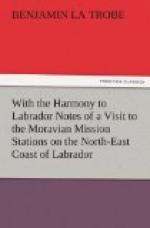Now the dogs are released from their harness and run away to their respective homes with glee. The sledge is unloaded, and its contents carried off by their owners. “When did you leave Ramah?” says the missionary to Thomas. “Yesterday morning,” replies the good fellow, keeping up the joke with thorough appreciation. I give them my hearty thanks, “Nakungmek,” for Thomas and Co. have not only given me a great pleasure, but provided interest for young friends at home, to whom I may detail my winter journey on a sunny autumn afternoon at Hebron. A real midwinter Labrador sledge journey, with the thermometer far below zero of Fahrenheit and the wind blowing hard and cold, is not so pleasant, especially if the dogs be quite invisible because of the driving snow. Should the traveller then be pitched off the sledge, and the drivers not perceive his absence at once, they may lose one another for ever. But God has watched over our travellers by sea and land, by ice and snow on many an errand of spiritual import to the settlers, or journey from station to station.
MY LAST SUNDAY IN LABRADOR.
Sunday, September 23rd.—Morning prayers in German with the house-family. Our venerable senior missionary read the texts and the Gospel for the day, and gave out suitable hymns, which were well sung by the company of brethren, and sisters, and children assembled in the dining-room around the long table. Breakfast is enlivened with cheerful, godly converse, and shortly after we join the Eskimo congregation in the first service of the day. I like this church as well as any in the land. It is proportionate, simple, neat and light. Mr. Wirth takes his place behind the table, and, what with residents and visitors, there is a goodly row of missionary brethren and sisters to right and left of him, facing the Eskimo congregation. Among the latter the white faces of a settler family, the Metcalfs from Napartok Bay, are conspicuous. Though the language be strange, I have already grown familiar with the liturgic forms of worship and can follow either the “Church Litany,” familiar to one in English and German, or the admirable responsive compilation of tests known as the Catechism Litany. The latter is chosen this morning, and it is quite possible that a negro congregation in Surinam, or a Kaffir congregation in South Africa may be using the same form of sound words, for it exists both in Negro English and in Kaffir.




